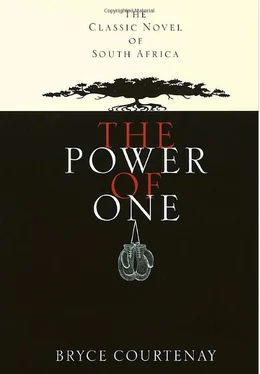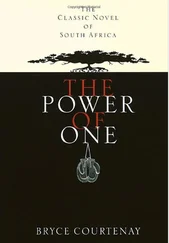Брайс Куртенэ - The Power of One
Здесь есть возможность читать онлайн «Брайс Куртенэ - The Power of One» весь текст электронной книги совершенно бесплатно (целиком полную версию без сокращений). В некоторых случаях можно слушать аудио, скачать через торрент в формате fb2 и присутствует краткое содержание. Жанр: Современная проза, на английском языке. Описание произведения, (предисловие) а так же отзывы посетителей доступны на портале библиотеки ЛибКат.
- Название:The Power of One
- Автор:
- Жанр:
- Год:неизвестен
- ISBN:нет данных
- Рейтинг книги:3 / 5. Голосов: 1
-
Избранное:Добавить в избранное
- Отзывы:
-
Ваша оценка:
- 60
- 1
- 2
- 3
- 4
- 5
The Power of One: краткое содержание, описание и аннотация
Предлагаем к чтению аннотацию, описание, краткое содержание или предисловие (зависит от того, что написал сам автор книги «The Power of One»). Если вы не нашли необходимую информацию о книге — напишите в комментариях, мы постараемся отыскать её.
The book is made to movie with the same name.
The Power of One — читать онлайн бесплатно полную книгу (весь текст) целиком
Ниже представлен текст книги, разбитый по страницам. Система сохранения места последней прочитанной страницы, позволяет с удобством читать онлайн бесплатно книгу «The Power of One», без необходимости каждый раз заново искать на чём Вы остановились. Поставьте закладку, и сможете в любой момент перейти на страницу, на которой закончили чтение.
Интервал:
Закладка:
The Kommandant promised Doc he would be released the day peace was declared in Europe, whether his papers were in order or not. We were already into the first days of summer, and Doc and I had talked about being out of prison in time for the firebells, the exquisite little orange lilies no bigger than a two-shilling piece, flecked with specks of pure gold, which bloomed throughout the hills and mountains after the bushfires. Doc was disappointed when the firebells came and went and VE day had not arrived.
We had already arranged for a new depository for the tobacco leaves, sugar and salt and, of course, the precious mail. These were placed in a watering can made of a four-gallon paraffin tin which had been fashioned originally for Doc’s cactus garden. The homemade watering can had been doctored by Geel Piet. A false bottom had been inserted leaving a space which was cunningly fitted with a lid to look like the real bottom. Filled with water the home-made watering can looked perfectly normal, and would even work if it became necessary to appear to be watering plants. It was left standing in Doc’s cactus garden and on my way to breakfast I would simply pass through the garden and put the mail and whatever I’d brought into the false bottom of the can. It was natural enough for me to go to the warders’ mess via Doc’s cactus garden as I often brought new plants for the garden. The warders almost never came this way and habitually used the passage in the interior of the building to get to the mess. We had been using this method for some months as the idea was to make it routine before Doc left and the piano stool with him. The Kommandant understood Doc’s need for his cactus garden and decided it would remain as a memorial to Doc’s stay, also allowing that Geel Piet could maintain it. As I would be continuing on with the boxing squad, the new system was nicely designed to work without Doc.
The writing of the letters proved to be a more difficult task. Geel Piet wrote with great difficulty at a very elementary level. Without Doc to take dictation, the prisoners would be unable to get messages to their families and contacts. This was solved when Geel Piet and I approached Captain Smit to ask if, for half an hour after boxing, I could give Geel Piet a lesson to improve his reading and writing. Captain Smit was reluctant to agree at first but finally gave his consent.
A strange relationship had grown up between the captain and the little coloured man. They only spoke to each other on the subject of boxing and Captain Smit would occasionally belittle a suggestion from Geel Piet to one of the boxers, but you could see that he respected Geel Piet’s judgement and it was only to show who was the boss of the boxing squad. In the months which followed my win against Killer Kroon I continued to enter the ring against bigger, stronger and older opponents, yet had never lost a fight. Captain Smit saw in me the consummate skill Geel Piet had as a coach and secretly admired him for it.
I knew this because Bokkie de Beer said Captain Smit had told his pa that I would be the South African Champion one day, ‘… because, man, he is getting the right coaching from the very beginning.’
Under the guise of learning how to read and write, Geel Piet would stare into a school book and dictate the prisoners’ letters to me. His facility for remembering names and addresses was quite remarkable. He claimed it was easy for him, he could remember the names of the horses and their odds for every Johannesburg maiden handicap since 1918.
We had the new system up and running well before VE day and while it wasn’t quite as foolproof or as convenient as the piano stool, it worked well enough. Geel Piet was too old a lag not to maintain absolute caution and he would never let me get careless or less mindful of the risks involved. For instance, on rainy days I would bring nothing to the prison as the idea of my taking the outside path in the rain to the warders’ mess rather than through the interior passage would seem both silly and, to an alert warder like Borman, suspicious. Nor would the drops be made every day or on the same days. Geel Piet was smart enough to know that little boys are not consistent and so he created this random pattern for my drops even allowing that on some dry days I would take the interior passage to the mess as well. While the system was clumsy and not as convenient as the old one, it was very fortunate that Doc was smart enough to initiate it some time before he left.
One morning, shortly after he had been promoted to lieutenant, Borman wandered into the hall while we were practising. This was simply not done. The Kommandant’s orders were that we should not be disturbed during our morning session, two geniuses at work, so to speak. Lieutenant Borman walked over to us, his boots making a hollow sound on the sprung floor. I continued to play until his foot steps ceased as he came to a halt just behind me.
‘Good morning, Lieutenant Borman,’ we both said together.
‘Morning,’ Borman said in a superior and disinterested way. He was carrying a cane not unlike the one Mevrou had carried and with it he tapped the leg of the piano stool. ‘Stan’ up, man’ he said to me. I rose, and he bent down on his knees and with his index finger and thumb stretched he measured the width of the seat. ‘A bit deep, hey, maybe something lives inside this seat?’ He got down on all fours and put his head under the seat. ‘Maybe a false bottom, hey?’ He tapped the bottom of the piano stool which gave off a hollow sound. ‘Very inter-res-ting, very clever too.’ Doc rose from his stool, inserted the key into my stool and raised the lid. Lieutenant Borman started to rise. Halfway up he could see that the seat was filled with sheets of music. Remaining in a crouched position he stared at Doc and me for what seemed like a long time. ‘You think this is funny, hey? You think this is playing a funny joke on a person?’
‘No, Lieutenant,’ Doc said, his voice surprisingly even. ‘I think only you should ask before you look. Inside lives only Klavier Meister Chopin.’ He opened the lid of his own stool, ‘And here lives also Herr Beethoven, Brahms, Mozart and Bach and maybe are visiting also some others, perhaps Haydn, Liszt and Tchaikovsky, but not Strauss, definitely not Strauss. Like you, my dear Lieutenant, Strauss is not welcome when I am teaching.’
Lieutenant Borman rose to his full height. He was a big man with a roll of gut just beginning to spill over his belt, and was used to looking down at people, but Doc’s six foot seven left him five inches short as the two men stared at each other. The lieutenant was the first to drop his eyes from the gaze of Doc’s incredibly steady blue eyes. He laid the cane on top of the Steinway and hitched his pants up. ‘You think I don’t blêrrie know things is going on? You think I’m a blêrrie fool or something, hey? I got time, I got plenty of time, you hear?’ He picked up the cane then brought it up fast and down hard against the open lid of my piano stool, the blow knocking the lid back into place. The sound of the cane against the leather top echoed through the hall. He turned slowly to face Doc again, pointed the cane at Doc so that it touched him lightly on the breast bone as though it were a rapier. ‘Next time you try to be cheeky you come off secon’ bes’. I’m telling you now, you kraut bastard, I’m finish an’ klaar with you both!’ He turned and stormed out, his heavy military boots crashing and echoing through the empty hall.
‘Phew!’ I sighed as I closed the lid of Doc’s piano stool and sat down weakly on my own. Doc also sat down, reached over to the Chopin Nocturne No. 5 in F sharp major on the Steinway music rack and commenced to fan himself with it. He was silent for a while, seemingly lost in thought, then said softly, ‘Soon come the hills and the mountains.’
Читать дальшеИнтервал:
Закладка:
Похожие книги на «The Power of One»
Представляем Вашему вниманию похожие книги на «The Power of One» списком для выбора. Мы отобрали схожую по названию и смыслу литературу в надежде предоставить читателям больше вариантов отыскать новые, интересные, ещё непрочитанные произведения.
Обсуждение, отзывы о книге «The Power of One» и просто собственные мнения читателей. Оставьте ваши комментарии, напишите, что Вы думаете о произведении, его смысле или главных героях. Укажите что конкретно понравилось, а что нет, и почему Вы так считаете.












